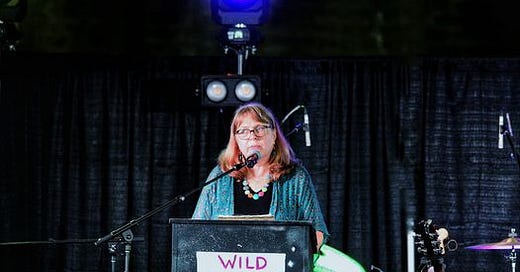

Discover more from The Cottage
Last week, it happened again.
I was at First Baptist Church in Columbia, Missouri, a very progressive congregation in a great college town. The church invited me to kick off the celebration of their 200th anniversary. I talked about history and current events — all rich conversations. I loved being with them.
So what happened again? On the long drive from the St. Louis airport to Columbia. I asked the pastor how things were going post-pandemic.
She shared that new people were coming to the church. Then she added that a “surprising number” are people who used to go to evangelical churches.
I laughed. “You’ve no idea how many times I’ve heard that in the last year. At every single church event, a pastor has told me the exact same thing. Ex-evangelicals, deconstructing evangelicals, searching post-evangelicals — they are showing up.”
Same thing, new city. That’s what happened again.
Are we seeing the beginning of a quiet trend?
All of this is anecdotal, of course. It isn’t a trend that I can prove — and it is probably not substantial enough to show up in national surveys. But everywhere I’ve been, I’ve heard the same thing. And pastors from other churches have emailed or DM’ed me mentioning the same. It appears — from these scattered reports — that some progressive mainline churches are seeing the post-pandemic arrival of ex-evangelicals looking for different spiritual communities and seeking new theological perspectives.
This doesn't mean that all ex-evangelicals are making this shift, but it suggests that at least some are. Nor does it mean that every liberal church can expect people who are leaving evangelicalism to come to your church. But it does mean that someone may be “visiting” — especially online — to try to discover if you might be safe harbor on their journey.
What is happening now reminds me a bit of a similar (and often overlooked) movement in the 1990s and early aughts. Then, Catholics who were discouraged by their church’s views on women’s ordination and divorce — or angry about the sexual abuse scandals — found their way into progressive mainline churches.
These Catholic-to-mainline switchers strengthened many congregations, eventually showed up as a minor membership uptick in some denominations, and increased Sunday attendance in many places. They also brought with them many gifts that enriched mainline Protestant communities, especially spiritual practices like contemplation and new liturgical sensibilities around weekly communion. (I discussed this in my 2006 book, Christianity for the Rest of Us.)
American religion has always involved switching. It may be that the next disaffiliation wave benefitting the old mainline will come from disgruntled and deconstructing evangelicals as they discover progressive churches.
A word of caution here. Trends in religion show that many of those who have left Christianity will — most likely — never return to any sort of church. This won’t be a trend where folks will knock down your doors. Don’t expect a tsunami to overwhelm your congregation — but there might be a kind of spring of newcomers curious about who you are and how you practice faith. The percentage of post-evangelicals seeking something new probably will be relatively modest and, perhaps, even regionally specific. Welcoming folks from evangelical churches will be much, much harder than when all the Catholics suddenly showed up.
If you are part of a progressive congregation or spiritual community and are open to such newcomers, I have a few suggestions that could help:
You're going to have to prove yourselves trustworthy, open, and accepting. You'll need to earn their respect. Not only will some of the newcomers be hurt and apprehensive, but there are decades of animosity between evangelical and mainline Protestants. Ex-evangelicals were schooled in that (as were mainliners!). Expect misunderstanding.
You’re going to have to answer a lot of questions about the Bible, theology, and polity. You’ll probably have to explain why you ordain women (with specific Bible verses), how you understand Romans and homosexuality, what the Book of Revelation really means, whether the penal substitutionary theory is the only right way to interpret the atonement, and if you think Hell is real. Trust me, you are going to have to explain your own tradition without assuming anything. Being able to answer questions and enjoy theological discussions matters. Be open to interesting and unexpected conversations.
One of your best resources will be the ex-evangelicals already in your congregations — those who grew up in evangelicalism in the 70s and 80s and who left a while ago. They are there, in your pews. Even if they don’t talk about it much. But they'll understand. (I know. I am one.) They could be good mentors to younger ex-evangelicals. Also, have at the ready a great library of books, videos, and streaming material on progressive theology, ethics, and social justice.
Younger ex-evangelicals grew up in a far narrower, far more intellectually reactive, and right-wing political environment than many of us did in the mid-late 20th century. Purity culture, CCM (Contemporary Christian Music), abortion politics — it’s a different ballgame than decades earlier. Watch out for religion-trauma triggers. Once newcomers feel safe, however, they may want to talk through some tough issues. Don’t shy away from talking about politics in ways appropriate to your community.
Create a culture of storytelling — "journey telling" — in your congregation. I'm a BIG believer in the power of spiritual memoir to heal rifts and mend our own hearts. Listening to and learning from each other’s stories will go a long way toward welcome, acceptance, and mutual appreciation. I can guarantee that many mainline churchgoers will be amazed by the spiritual and theological seriousness of post-evangelicals. And I’m equally confident that evangelical switchers will be floored by the testimonies of those who have served on your altar guild or as ushers for fifty years and by the richness of your history, compelling liturgy, and multigenerational pastoral care.
A final word to my mainline friends:
Dump the magical thinking.
If ex-evangelicals show up to your congregation, it isn’t about fixing your problems. It is about their search for healing, compassion,
and a different way of being Christian.
Nobody's going to save your church (or your denomination) unless you put in the hard work of listening, learning, and authentically caring about the lives and hurts and hopes of the people who wend their way to your community. If you’ve found meaning and purpose in your spiritual life and journey, make sure to share it!
And a warning: Ex-evangelicals won’t come to your church because they want it to be like what they left — they might come because they are hoping, with all their hearts, there's a path to walk with others toward a God of love.
That want a church that isn't mean, and one that isn't in the news every other week for hypocrisy and scandal. They want acceptance, a place to rest — and to explore.
Love God. Love your neighbor. Love the messy, beautiful diversity around you. Love the wounded world.
Practice joy and justice. Trust. Tell the stories of faith over and over and over again. Create, imagine, envision.
Be your most beautiful, welcoming selves.
Don't be fake.
If you hang out a rainbow flag or an "Everyone is Welcome" sign, do it for real. Make sure no one who comes feels like a target for your stewardship campaign. For goodness sake, don’t try to sign them up for anything!! Give those who come your way time and room to grow. Invite them to dinners and parties; don’t make them work.
Welcome them as pilgrims.
Do you know how much COURAGE it takes to go to a new church these days? It is a miracle that people who have almost given up might be willing to give you a chance — because they are looking for God, hope, and love.
You can do this. I know you can.
INSPIRATION
Traveler, your footprints
are the only road, nothing else.
Traveler, there is no road;
you make your own path as you walk.
As you walk, you make your own road,
and when you look back
you see the path
you will never travel again.
Traveler, there is no road;
only a ship's wake in the sea.
— Antonio Machado
I have walked through many lives,
some of them my own,
and I am not who I was,
though some principle of being
abides, from which I struggle
not to stray.
When I look behind,
as I am compelled to look
before I can gather strength
to proceed on my journey,
I see the milestones dwindling
toward the horizon
and the slow fires trailing
from the abandoned camp-sites,
over which scavenger angels
wheel on heavy wings.
Oh, I have made myself a tribe
out of my true affections,
and my tribe is scattered!
How shall the heart be reconciled
to its feast of losses?
In a rising wind
the manic dust of my friends,
those who fell along the way,
bitterly stings my face.
Yet I turn, I turn,
exulting somewhat,
with my will intact to go
wherever I need to go,
and every stone on the road
precious to me.
In my darkest night,
when the moon was covered
and I roamed through wreckage,
a nimbus-clouded voice
directed me:
"Live in the layers,
not on the litter."
Though I lack the art
to decipher it,
no doubt the next chapter
in my book of transformations
is already written,
I am not done with my changes.
— Stanley Kunitz
NEWS FROM THE COTTAGE
Summer is here. And that means it is time for our July Summer Journey for paid subscribers.
This year’s theme: BEYOND CHRISTIANITY AFTER RELIGION
A question I’m asked frequently is how I would revise Christianity After Religion — which was published in 2012 — now, just over a decade later.
I suggested to my publisher that I should write an addendum or a revision for the book’s 10th anniversary. They took a pass, and I was disappointed.
But then I realized that this is exactly the purpose of Substack! The Cottage is a place where ideas can be explored without permission from traditional publishing. Let’s do this together.
Every Wednesday in July, you can expect a mini-essay update on four questions raised in this decade beyond Christianity After Religion.
July 5: What about the numbers now?
July 12: Does “belonging” still come first? What does it mean to “belong”?
July 19: Are the last few years really just a backlash?
July 26: Do you still hope for an Awakening?
Overall, I’ll be addressing HOW MY MIND HAS CHANGED (or remained the same) regarding a book that I wrote years ago. At the end of the month, you’ll have a mini-book of updated thoughts on the future of Christianity.
You are invited to consider the same question: How has your mind changed about Christianity — and about the future of faith in light of the last decade?
That’s our July journey. We’ll travel over some familiar territory to see the landscape differently. I’ve got lots to say — about what surprised me (both good and bad), what I missed about race, Donald Trump and authoritarianism, and the conflict over “woke” and “Awakening.”
We’ll have a lot of cool stuff to talk about. And we get to reflect about what we’ve all been through and gain some perspective. It is summer — so it isn’t a formal class. It will be casual, a seasonal refresher intended to renew our imagination and hope.
Think of it as gathering around a campfire and sharing our stories.
I’ll put out a weekly reading plan for the book if you want to re-read it or read it for the first time. There’ll be some additions along the way — chat threads, questions submitted from readers, our Zoom gathering, and specific question prompts.
If for any reason, you can’t afford a subscription, drop us a line and let us know. Email to the.cottage.email@gmail.com. No one is ever turned down for lack of funds.
Last week, there was a glitch in the EventBrite registration link. It is now fixed and you CAN register.
➡️ SOUTHERN LIGHTS IS BACK! ⬅️
January 12 -14, 2024
Last January, almost 700 people gathered at St. Simon’s Island in Georgia for a packed weekend of poetry, theology, and music.
WE’RE GOING TO DO IT AGAIN!
YOU ARE INVITED to join me and Brian McLaren as we reimagine our faith together beyond patriarchy and hierarchy in our interior lives, in our communities of faith, and in the Scriptures. We’ve asked three remarkable speakers to take us through this journey: Cole Arthur Riley, Simran Jeet Singh, and Elizabeth “Libbie” Schrader Polczer.
Please come and be with us in Georgia. Or, if you’d rather be with us online, you can choose that option as well.
MORE INFORMATION AND REGISTRATION CAN BE FOUND HERE.
Subscribers to The Cottage can receive an early bird discount of $15 off through July 31. ENTER this code: dbcottage24
ONE FINAL THING
You can listen to the Sunday Q&A from First Baptist, Columbia, MO. It was about Freeing Jesus — theology, spirituality, and writing. And we got into an intense discussion about politics around abortion and LGBTQ rights. They asked hard questions — and I gave answering them my all. I *think* I was on a roll.
















“Younger ex-evangelicals grew up in a far narrower, far more intellectually reactive, and right-wing political environment than many of us did in the mid-late 20th century. Purity culture, CCM (Contemporary Christian Music), abortion politics — it’s a different ballgame than decades earlier.”
As a spiritual director this is the first thing that struck me with my younger clients. I was amazed how much more toxicity the younger evangelical generation had to wade through.
I like your article. Both my wife and I have pretty much given up on organized religion. While the idea of a church family is nice, it doesn’t usually happen with newcomers unless they’re very young and likely to be around a while. Older newcomers seem to only useful to help with functions and are rarely ever considered friends.
We truly wish we could find a real church family.